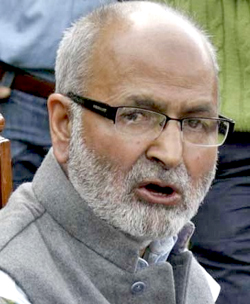Srinagar, Dec 27: The stalemate over government formation in Jammu and Kashmir continued for the fifth day today as PDP sought assurance from BJP over certain issues like safeguarding Article 370 and revocation of AFSPA which form the core agenda of the regional party.
 "All options are still open, no decision has been taken yet on formation of government in the state with any other party," PDP spokesperson Naeem Akhter said.
"All options are still open, no decision has been taken yet on formation of government in the state with any other party," PDP spokesperson Naeem Akhter said.
He said the leadership of PDP, which emerged as the single largest party in the assembly elections, was discussing all its options for government formation including an alliance with the BJP.
"There are certain issues which form our core agenda and require an assurance that these will be accepted by our potential alliance partner, whichever party it might be," he said.
Akhter said his party's stand on safeguarding Article 370, which guarantees special status to Jammu and Kashmir within the Indian union, was non-negotiable.
He also said that the party was committed on revocation of Armed Forces Special Powers Act from the state, besides initiating a political process for resolution of Kashmir issue.
Asked if his party would consider the demand for rotational chief ministership from any future alliance partner, the PDP spokesman said the negotiations have not reached that stage with any of the parties.
He said Congress has also given a proposal for government formation to the PDP which is under the consideration by the party.
On the National Conference's offer of unconditional support to PDP for government formation, Akhter said his party has received no such communication so far from its arch rival.
"As and when such an offer is received we will surely discuss it and decide the future course of action," he said.
National Conference working president Omar Abdullah yesterday said his party had only conveyed a "verbal offer" to the PDP through an intermediary.
The PDP leadership is caught in a 'catch 22' situation with some influential leaders within the party strongly opposing an alliance with the BJP on the grounds that such a partnership can reverse the gains made by the party during recent times.
A senior PDP leader, on the condition of anonymity, said an alliance with the BJP which emerged as the second largest party with 25 seats, would be "suicidal" for the regional party.
"While good governance and development is a universal yearning among the people, people in a sensitive place like Kashmir also keenly watch the friends you keep. One of the reasons for decline of National Conference was its hob-nobbing with which ever party was in power at the centre," he said.
National Conference, which has 15 seats and can play a key role in government formation, withdrew from the race following open expression of dissent by some senior party leaders after reports suggested that the regional party had entered into parleys with BJP to cobble up an alliance.
The results for the state assembly elections on December 23 threw up a hung verdict with no party getting clear majority.
Congress, with 12 MLAs, is neither in a position to form the government or help PDP or National Conference to cross the 44 seat mark in the 87-member state assembly.
Congress spokesman Salman Nizami yesterday said the party was in touch with PDP and six other Independents to prevent BJP from coming to power in the state.
State Governor N N Vohra has invited PDP and BJP for separate discussions over government formation.
"The Governor has asked the two parties to inform him about the developments on government formation in the state," Raj Bhavan sources had said.
All eyes are now on the PDP to come up with its decision on government formation in the state.






Comments
Add new comment